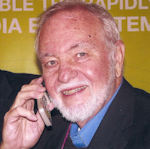Do You Know Your Internet Access Speed? The FCC Wants You To
The Federal Communications Commission (FCC) recently conducted a survey to determine if consumers actually know their Internet access speed, whether it’s via cable, DSL, wireless, or even dial-up. A full 80% admitted they didn’t know their download speed. On the other hand, despite this lack of knowledge, most consumers (91%) are very or somewhat satisfied with the data rate they’re getting.
Most consumers with a broadband connection couldn’t care less about the data rate as long as it’s “fast enough.” Asking consumers about their Internet download speed is like asking them the horsepower and torque specs for their cars. Who cares? As long as your downloads take place almost instantaneously or within a few seconds, you’re probably happy.
Once the download speed reaches above 1 or 2 Mbits/s, we’re generally satisfied—unless, of course, we’re downloading a great deal of video or playing games. Video is the decider. You need more than 4 to 6 Mbits/s to get decent streaming video performance or quick downloads.
The FCC generally defines broadband as any speed above 768 kbits/s, along with categories of 768 kbits/s to 3 Mbits/s, 3 to 6 Mbits/s, 6 to 10 Mbits/s, and 10 to 20 Mbits/s (see “Broadband For Everyone” ). You really have to ask why the FCC is interested in this, even if most consumers don’t care.
Essentially, the FCC is trying to get a handle on the state of broadband deployment in the U.S. Such data impacts the FCC’s National Broadband Plan and well as its push for net neutrality (see “Is Net Neutrality Really A Cure For What Ails The Internet?”). The FCC also believes that an educated consumer will be better prepared to shop for and compare broadband services where two or more local options are available.
The FCC survey additionally covered consumer satisfaction levels for cell-phone service, including wireless broadband. Ninety percent of consumers reported that they were very or somewhat satisfied with their cell-phone performance. But among smart-phone owners, only 71% are very or somewhat satisfied with their wireless Internet access. That isn’t surprising.
Wireless broadband is still finding its way. Carriers are still rolling out 3G wireless connections, and few currently offer great speeds. Some sites with the latest 3.5G technology can provide reasonable rates of 1 to 2 Mbits/s and better than 4 Mbits/s if you’re near the site with a good connection. Those rates will keep getting better as more HSPA and EV-DO Rev. B systems become available.
Clearwire/Sprint is getting speeds of 4 to 5 Mbits/s with its 4G WiMAX service with a straight line-of-sight connection. And of course, Long-Term Evolution (LTE) will really deliver great wireless data rates, up to 100 Mbits/s in a fixed situation with multiple-input multiple-output (MIMO). Handsets won’t get that much because of the difficulty of implementing MIMO in a cell phone. Yet speeds of 20 Mbits/s or more may be possible over a good wireless link.
The FCC’s Consumer Task Force recently announced two initiatives that will help determine the broadband speeds consumers are getting in their homes and on their mobile devices. This is a key recommendation in the National Broadband Plan.
In the first of these initiatives, the FCC is asking for 10,000 volunteers for a scientific study to measure home broadband speed in the U.S. Specialized hardware will be installed in the homes of volunteers to measure the performance of all the country’s major Internet service providers across geographic regions and service tiers. A Public Notice asking for comment on the test plan and can be found at hraunfoss.fcc.gov/edocs_public/attachmatch/DA-10-670A1.pdf.
This study will culminate in a “State of Broadband” report to be released later this year. The tests are also a key part of the Broadband Action Agenda, described at www.broadband.gov/plan/broadband-action-agenda.html.
Anyone can register as a volunteer for this national test at www.TestMyISP.com. Volunteers will be able to track the performance of their own broadband service, as well as provide valuable data for the FCC, Internet service providers, and the public at large.
In addition, FCC’s Consumer and Governmental Affairs Bureau issued a Public Notice to look at ways to measure mobile broadband speed.More and more consumers are using mobile wireless devices to access the Web, sometimes as a primary Internet connection. The Public Notice asks for input on the best ways to measure mobile broadband speeds, the ways that speed measurements can be used to help improve service, and the information consumers should have about the speed of mobile broadband coverage.
If you’re interested, watch at the FCC’s Web site at www.fcc.gov. And to run a speed test independently of the FCC, go to www.speedtest.net. You’ll probably be surprised at your download speed. Your upload speed is what’s usually pathetic.
here

